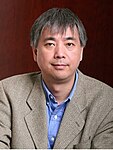Cui Zhiyuan
| Cui Zhiyuan 崔之元 |
|
|---|---|
 |
|
| Born | 1963 Beijing |
| Nationality | Chinese |
| Alma mater |
National University of Defense Technology Chinese Academy of Social Sciences University of Chicago |
| Organization | MIT, National University of Singapore, Harvard University Law School, Wissenschaftskolleg zu Berlin, Cornell Law School, Tsinghua University |
| Notable work | Second Liberation of Thought, Liberal Socialism and the Future of China |
| Movement | Chinese New Left |
| Website | www.cui-zy.com |
Cui Zhiyuan (Chinese: 崔之元), born in Beijing in 1963, is a professor at the School of Public Policy and Management in Tsinghua University, Beijing. His father was a nuclear engineer in Sichuan province. He is a leading member of the Chinese New Left through his work on alternatives to neo-liberal capitalism.
Cui first gained fame as a post-graduate student in 1994 when he published an article named 'Institutional Innovation and the Second Thought Liberation'(Oxford University Press, Hong Kong, 1997). Cui then went on to publish a book on the Nanjie Village, which along with his previous publications cemented his reputation as one of the founding members of China's New Left movement. Cui was also one of the first scholars who had introduced Game theory into China. Cui is an admirer of James Meade's work on liberal socialism, who affects his most characteristic article " 'Xiaokang Socialism' : A Petty-Bourgeois Manifesto". Following Meade's theory, Cui was the first scholar who proposed a systematic social dividend program in China, including a "Chinese People's Permanent Trust Fund".
Cui edited Politics:The Central Texts(Verso, 1997), which is the selection of key texts from Roberto Mangabeira Unger’s three-volume Politics. His selective writings include The Dilemma of the Paradigm of the Invisible Hand: Soft-Budget-Constraint in the Capitalist Economy(Jingji Kexue Publisher, Beijing, 1999). Cui co-authored(with Adam Przeworski et al) Sustainable Democracy (Cambridge University Press, 1994) and (for the UNDP) China: Human Development Report 1999 (Oxford University Press, 2000). He was also one of the contributors to Whither China?: Intellectual Politics in Contemporary China(Duke University Press, 2002). He also co-edited China and Globalization: Washington Consensus, Beijing Consensus or What? (Beijing, 2005) and was considered to be the first person who introduced the Beijing Consensus into the Chinese policy debate.
...
Wikipedia

